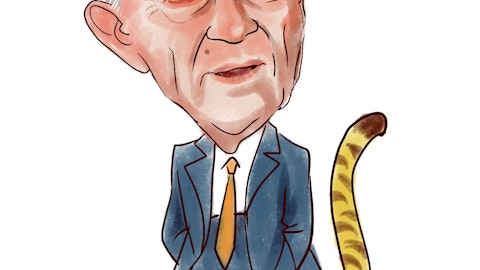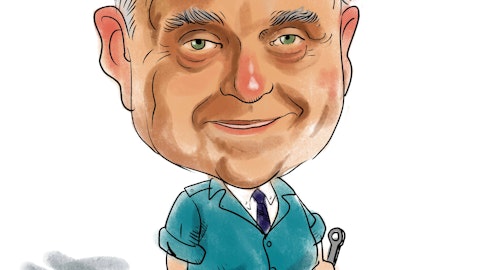
Switching banks. Robertson closed his positions in PNC Financial Services and Wells Fargo (NYSE:WFC), which according to his first quarter 13F had been two of his top ten holdings, and cut his stake in Goldman Sachs (NYSE:GS) (which, again according to that 13F, had held the #2 slot) by over 60%. Some of the proceeds from these sales went to initiating a position of about 380,000 shares in JPMorgan Chase (NYSE:JPM). We argued earlier this month that JPMorgan Chase and Citigroup are better bets than Wells Fargo, and it appears that we were just a few months behind Robertson’s own thought process. JPMorgan is a value stock with a trailing P/E of 9, a forward P/E of 7, and a P/B ratio of 0.8. In its most recent quarter the bank reported moderate declines in revenue and earnings compared to the same period in 2011, but we think it is still a good buy. The bank also pays a 3.2% dividend yield and last month Jamie Dimon bought shares of his company; insider buys are generally bullish signals.
AIG. The federally rescued insurer, which carries a $60 billion market cap, saw Tiger Management initiate a position of about 520,000 shares in the second quarter of 2012. American International Group (NYSE:AIG) has gradually been getting attention as a value stock. While it’s quite possible that some bad assets on its books are in need of write-downs, it trades at 0.6 times the book value of its equity. This gives investors quite a bit of room for error and suggests that poor sentiment has pulled the stock price away from the company’s fundamental value. AIG reported a 27% increase in earnings last quarter compared to the same quarter a year ago. Sell-side analysts are also optimistic on the stock, as it trades at 10 times earnings estimates for 2013 and at a five-year PEG ratio of 0.4. We think that Robertson has seen enough good results from the company to conclude that it’s not as risky as the stock price implies, and that it is a good value at these levels.
Qualcomm. Robertson increased his position in Qualcomm (NASDAQ:QCOM), which in the first quarter was one of the ten most popular technology stocks among hedge funds. Tiger now owns about 340,000 shares of the telecom company. Qualcomm had excellent results last quarter, reporting an increase in revenue of 28% and an increase in earnings of 17% compared to the same period the previous year. Wall Street analysts think that good growth will continue, providing earnings expectations which imply a forward price-to-earnings multiple of 15 (the trailing P/E is 18, itself a good level for a company which seems to be on a growth trend). As with AIG, Robertson’s thought process seems to be that even at low growth the company trades at a reasonable price, the business has been doing well recently, and it is expected to continue to do well in the future.
We still say that banks like JPMorgan are priced too low compared to Wells Fargo, and it is good to see that Robertson agrees with us on this point (as well as in relation to other banks that we may look at more closely in the future). We’re less sure about evaluations of AIG or Qualcomm, but on a quantitative basis they do look like value stocks and with one of the biggest names in finance buying in they could make good additions to a long portfolio as well.




